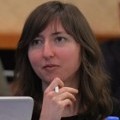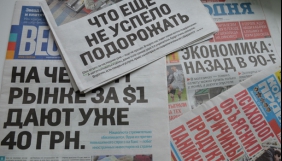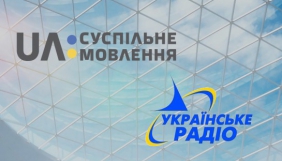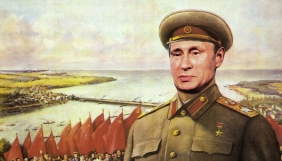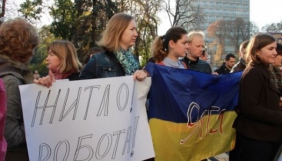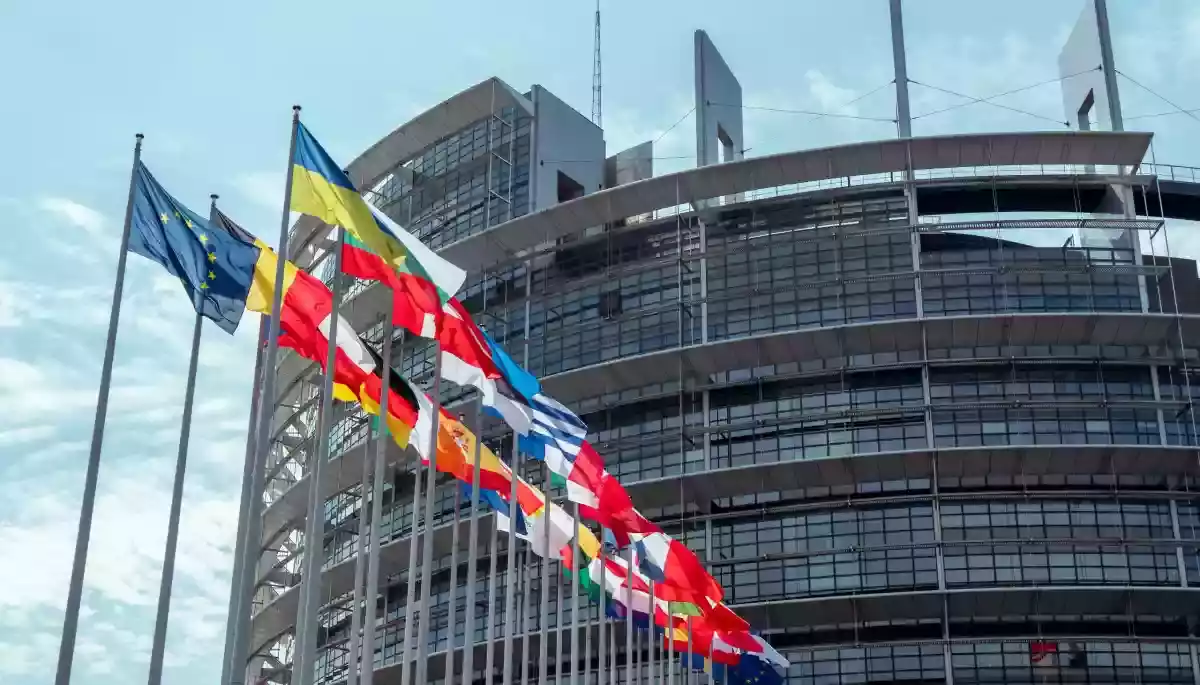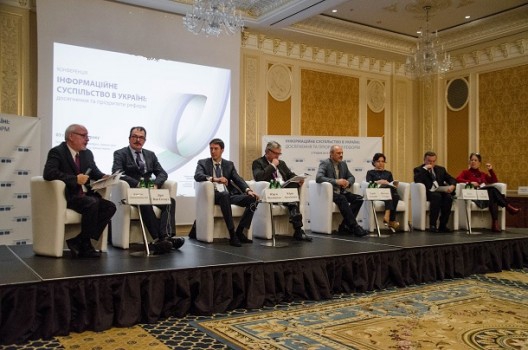
Media Reforms Evaluation: the Laws are Approved, but the Main Thing is to Implement Them
Media Reforms Evaluation: the Laws are Approved, but the Main Thing is to Implement Them
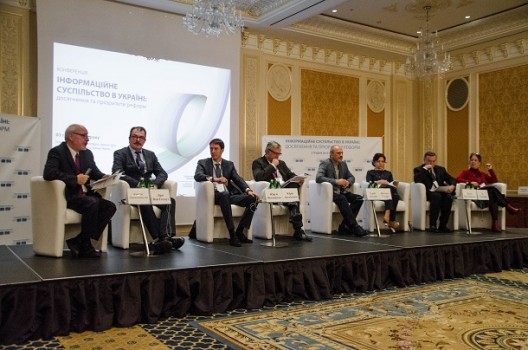

In Ukrainian
The changes taking place in the information space of Ukraine and the key media reforms introduced in recent years were discussed during the conference “Information society in Ukraine: achievements and priorities for reforms,” which was intended to sum up the joint programme between the European Union and the Council of Europe “Strengthening information society in Ukraine.” The conference engaged European experts as well as the heads of Ukrainian state structures and media organizations. The participants evaluated the reforms that were carried out and listed the next steps that are required. Apart from that, the representatives of 13 public organizations being the grantees of the programme also took part in the conference and presented the results of their work within the project.
“The joint programme between the European Union and the Council of Europe supported the reforms in four spheres: the freedom of mass media, the access to public information, the Internet governance, and personal data protection,” Christos Giakomopoulos, the special adviser to the Council of Europe’s Secretary General for Ukraine, notes. Together with other representatives of the EU and CoE, he admits that the main achievements of the project were the adoption of the laws on press denationalization and media property transparency as well as the process of public broadcaster transformation. Mr. Giakomopoulos underlines that effective introduction of media reforms is impossible without changed in other spheres. In particular, these are judicial system and the General Prosecutor’s office, which is especially important for the implementation of laws on access to public information.
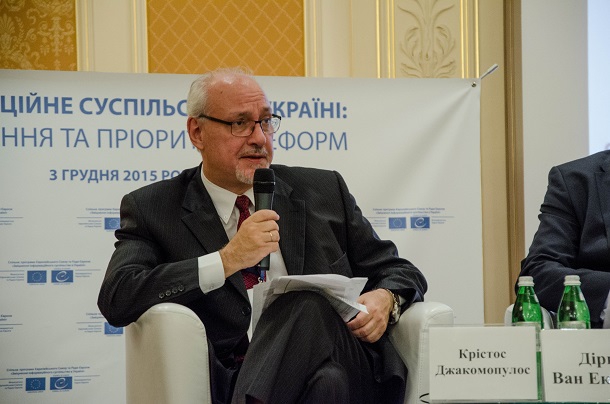
Christos Giakomopoulos
The Ukrainian and foreign participants repeatedly underlined that the implementation of laws, not only their adoption, is actually the main task for media sphere. “The next year will be indicative for both regional TV companies reforming and a pilot project on printed press (the first stage of the reform lasting for one year, during which only the mass media that will voluntarily give their agreement will be denationalized),” Oleg Nalyvayko, the head of the State Committee for Television and Radio Broadcasting of Ukraine, notes.
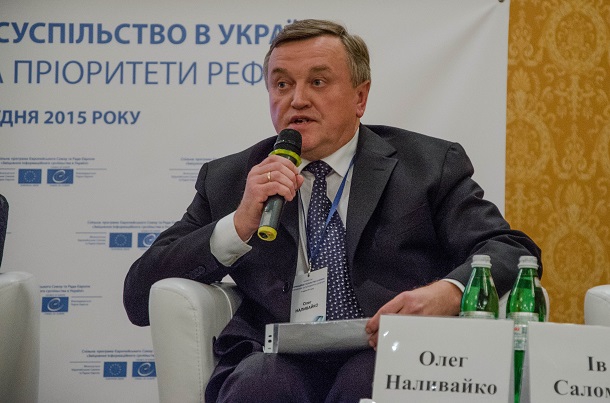
Oleg Nalyvayko
In opinion of Jurgis Vilčinskas, the head of Press and Communication at the EU Delegation in Ukraine, the most difficult thing will be to reform communal mass media: “We wish local media were granted enough space for development after denationalization and privatization; we wish the journalist groups would become the owners of media themselves; and, what is the most important thing, this process would not be stopped by bureaucracy. It is also significant for media not to become the space for jeansa and not to turn into the property of local establishment.”
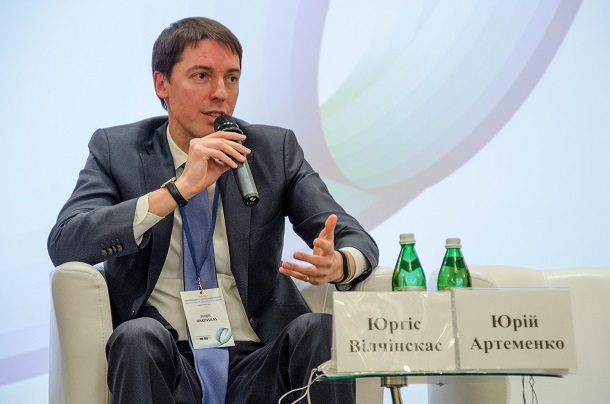
Jurgis Vilčinskas
“It will be a difficult period for local mass media, so long as competition will kill those who will not be ready for changes and re-training; the same can be said about transformation of regional television companies into the subsidiaries of public broadcaster,” Zurab Alasania, the general director of the National TV and Radio Company of Ukraine, admits. “If you saw the state budget for the next year, it is extremely hard for each branch,” he adds. “As for public broadcaster, there is no question of modernization at all; we’ll receive twice less than we had last year, at least according to the current version of the budget. But I’m not going to hand myself because of that. Anybody can do everything easily with money, and I will try to do it without money.”
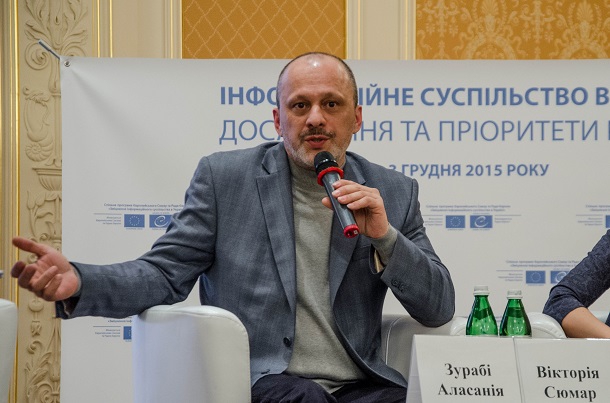
Zurab Alasania
Eve Salomon, the expert of the Council of Europe,underlines that current priority is to pass the law on audiovisual services, a key media document in accordance with the EU-Ukraine Association Agreement. She notes: “The bill must be discussed publicly by the state authorities, including parliamentary committees and the National Council for TV and Radio Broadcasting, together with civil society, and all the proposals should be studied. Still, the adoption of the law will be a political decision.”
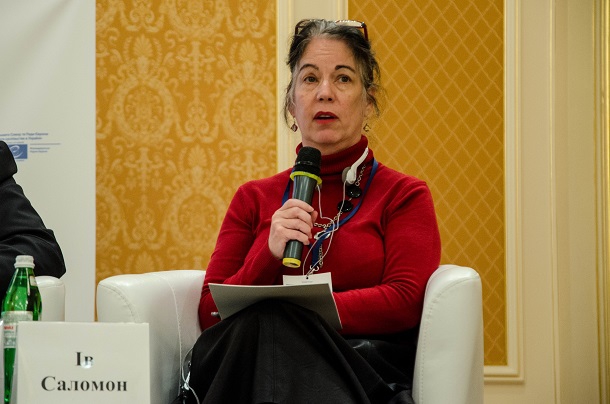
Eve Salomon
Other significant steps, according to Ms. Salomon, are to adopt the statute of public broadcasting by the Cabinet of Ministers, to prepare legislative ground for transition to digital broadcasting and to arrange the process of media self-regulation.
Yuri Artemenko, the head of the National Council for TV and Radio Broadcasting, reminds of one more change that took place this year: the methodology of mass media monitoring worked out by the experts of the Council of Europe has been prepared. According to Mr. Artemenko, this methodology helps to analyze the pluralism of mass media messages and the coverage of selected subjects. “It is important to underline that this methodology has already been tested in other countries, so we are planning to introduce it next year,” he says.
Mass media will have actual achievements when the majority of the Ukrainian citizens feel that the sphere has been really reformed, Viktoriya Syumar, the head of the parliamentary committee on freedom of speech and information policy, considers. “It will be an achievement when people manage to distinguish objective information from propaganda,” Ms. Syumar notes. “This people’s awareness, which is called media literacy, is what we are to work with in order to shape a request for quality information. It is one of the basic reforms, although not so much attention is paid to it as it is to others. If there is no quality environment, we will perceive everything in a distorting mirror. These are the standards, self-regulation, and media literacy that require support.”
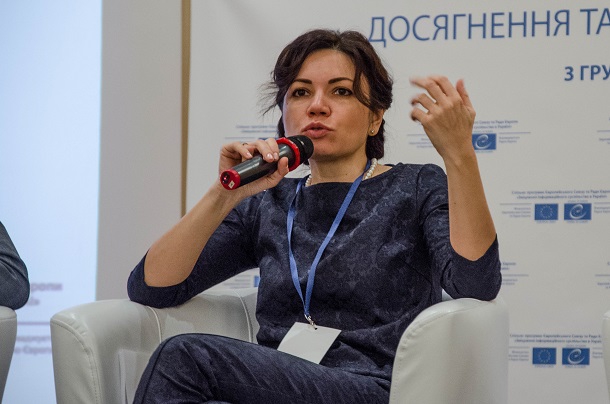
Viktoriya Syumar
Dirk Van Eeckhout, the Ambassador Extraordinary and Plenipotentiary, the Representative of Belgium to the Council of Europe, agrees that the implementation of laws is important; however, according to him, the laws themselves are rather significant as well: “We should not underestimate the importance of correct specification of every wording. The ideas turned into words describing our future are the laws. Good laws are only a half of job, but it is already a half of job. The Council of Europe and the EU are strategic partners of Ukraine and we’ll be here for a long time.”
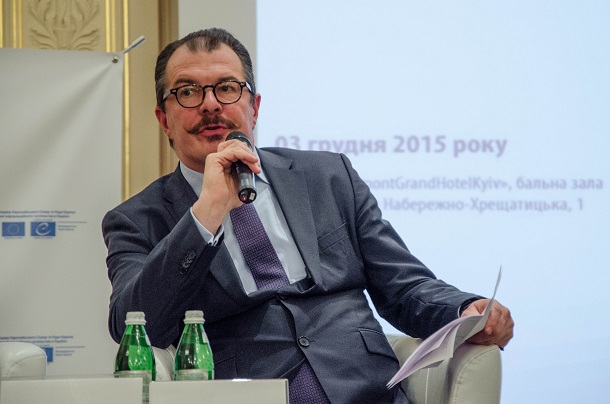
Dirk Van Eeckhout
On Access to Public Information
There was a special discussion on the access to public information and personal data protection. “Both of these rights are equal, but they are not absolute; in practice, they are often restricted. Therefore, it is important to know how to balance two of these rights in a best way, both in practice and in legislation,” Dmytro Kotliar, the lawyer and expert of the Council of Europe, says. He reminds that a bill #2913 “On amendments to particular laws of Ukraine in the sphere of access to public information, concerning the improvement of certain statements in them” is now on approval of the parliament. The main changes proposed by the bill make up a big set of technical alterations in the wordings of particular articles, which will help to avoid misuse while interpreting certain concepts. Another set is intended to assign a body controlling the adherence to laws on the access to public information.
Indeed, the problem of adherence to legislation is still topical: during all the years of the law on access to public information being in action, the level of adherence to it is not improving, because government employees have no understanding why they are to dispose information about themselves, Mr. Kotliar says. “The deputies have a permanent fear that we are restricting their right to privacy.” The same is about the law on personal data protection: state and private structures as well as most of population groups have no understanding what it is at all.
While before December 2014 supervision over the adherence to legislation in these spheres was exercised by public prosecutor’s office, today it is exercised by the ombudsman. “The work of the public prosecutor’s office was not effective in this direction, but it benefited from the ramification of its structure,” Valeriya Lutkovska, the Ombudsman of Ukraine, explains. “The control was passed to us, but we have much less people. In order to find a way out, we decided to work by the system Ombudsman Plus. It means that we involve the representatives of public monitors in the regions to supervision over the adherence to legislation. Otherwise we cannot be effective in district centres, for example, while there is the same public information. We want to make the society act as the main supervision body, which would be interested in the obtainment of information.”
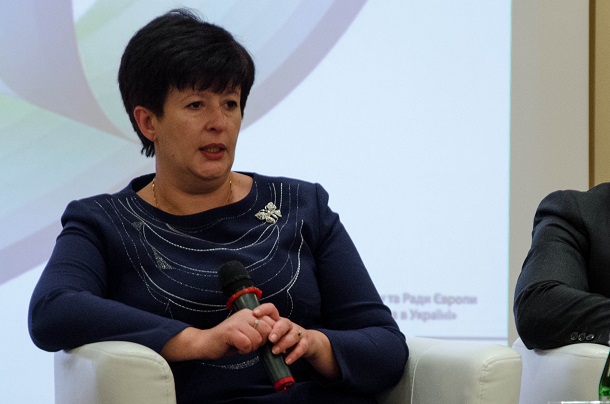
Valeriya Lutkovska
As for personal data sphere, “Personal Data Protection School” created with the assistance of the Council of Europe project under the Ukrainian Catholic University turns to be effective. According to Ms. Lutkovska, it helps to response to violation of laws efficiently. “For example, we have found out that the military registration and enlistment offices demand such data as property qualification of parents or their nationality via the forms for conscripts (the students of high school),” Ms. Lutkovska tells. “After that, we turned to the Ministry of Defense, gathered the representatives of the military registration and enlistment offices and the general staff of the Ministry of Defence in order to tell them about personal data and how to process them legally.” Another example is when some of the media published the lists of the conscripts who refused to take part in mobilization, which violated both the law on personal data protection and the law on access to public information.
What is more, there were training programs conducted for government employees, lawyers, law enforcement officials, public health employees, and judges. The latter category is extremely important, Ms. Lutkovska notes. “If a judicial system is not ready, we cannot speak about effective implementation. We have performed a number of trainings for judges: we should realize that our own legislation is not enough; we should consider the practice of the European Court of Human Rights, comprehend the 10th article of the Convention for the Protection of Human Rights and Fundamental Freedoms, and know the statements of the 8th article of the European Convention on Human Rights that deals with the right to privacy.”
The Internet Sphere
In 2014 and 2015, the joint programme of the Council of Europe and the European Union also assisted in the performance of the Ukrainian Internet Governance Forum and in the international forums (in particular, the global Internet Governance Forum, Istanbul, 2014 and the Pan-European Dialogue on Internet Governance, Sofia, 2015).
Volodymyr Kukovsky, the secretary of the Ukrainian Internet Governance Forum (IGF-UA), reports that during this time, there were several events held to raise the awareness of the Internet providers of the adherence to human rights. For example, a special CoE manual for providers was spread by means of the Ukrainian Internet Association. “In addition, we spread a CoE manual on the rights of Internet users, arranged an event on the Safer Internet Day, supported a social study “New dangers of the Internet under military actions as viewed by children” and launched a project Skarga,” Mr. Kukovsky says. In March 2015, there was a competition for the best web-site of an educational institution / school performed with the assistance of the Ukrainian Internet Association and the Ministry of Education. About 800 web-sites took part in the competition.
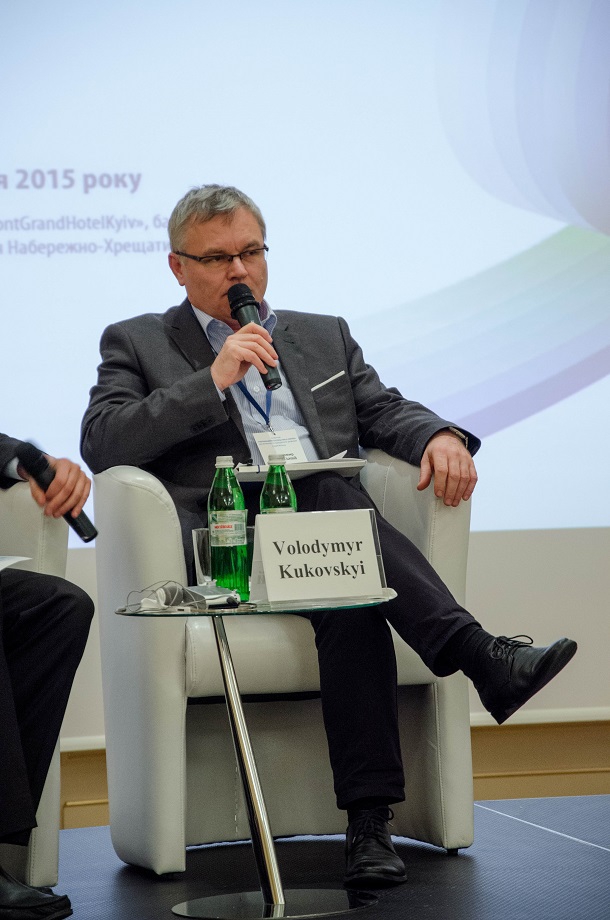
Volodymyr Kukovsky
“Working legislatively, we aspire to fix the citizens’ right to free access to the Internet at a constitutional level. At the moment, only Finland out of all European countries has such a norm,” Mr. Kukovsky explains.
Tetiana Pustovoitova, the head of International Relations Department of the National School of Judges of Ukraine, notes that they have worked out educational courses “The Internet and Human Rights for Judges.” “When a crime is committed via the Internet, the citizens turn to the court to defend their rights. Therefore, it is extremely important for a judge who sits on the case to be qualified in this sphere, to know the details of legislation on the Internet,” Ms. Pustovoitova says. The course they have worked out will be introduced into the educational program of the National School of Judges.
For reference
The joint programme between the European Union and the Council of Europe “Strengthening Information Society in Ukraine” aims at strengthening the protection of human rights and fundamental freedoms by providing: more freedom, diversity and pluralism in mass media; transparent, thorough, stable, and citizen-oriented approach to the Internet in terms of human rights; effective system for citizens’ protection considering the right to private life and the right to control over their personal data.
The programme budget makes up €2.76 million; the programme is under implementation in 2014-2015.

